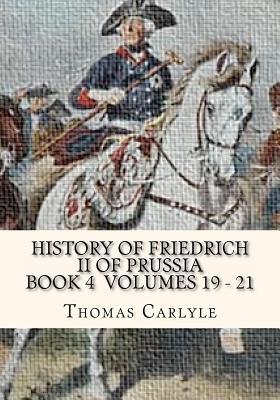History of Friedrich II of Prussia Volumes 19-21: Frederick the Great
by Thomas Carlyle
Frederick II of Prussia (Frederick the Great) (January 24, 1712 August 17, 1786) King of Prussia Rein 1740 to 1786. Under his leadership, Prussia created the foremost military power in Europe. Excerpt The posting of the Five Armies this Winter--Five of them in Germany, not counting the Russians, who have vanished to Cimmeria over the horizon, for their months of rest--is something wonderful, and strikes the picturesque imagination. Such a Chain of Posts, for length, if for nothing else! From the centre of Bohemia eastward, Daun's Austrians are spread all round the western Silesian Border and the southeastern Saxon; waited on by Prussians, in more or less proximity. Next are the Reichsfolk; scattered over Thuringen and the Franconian Countries; fronting partly into Hessen and Duke Ferdinand's outskirts: --the main body of Duke Ferdinand is far to westward, in Munster Country, vigilant upon Contades, with the Rhine between. Contades and Soubise, --adjoining on the Reichsfolk are these Two French Armies: Soubise's, some 25,000, in Frankfurt-Ems Country, between the Mayn and the Lahn, with its back to the Rhine;
Paperback, 730 pages
Published August 31st 2012 by Createspace Independent Publishing Platform (first published June 17th 2009)
© 2025 Bibleportal.com 版权所有.

Thomas Carlyle was a Scottish satirical writer, essayist, historian and teacher during the Victorian era. He called economics "the dismal science", wrote articles for the Edinburgh Encyclopedia, and became a controversial social commentator.
Coming from a strict Calvinist family, Carlyle was expected by his parents to become a preacher, but while at the University of Edinburgh, he lost his Christian faith. Calvinist values, however, remained with him throughout his life. This combination of a religious temperament with loss of faith in traditional Christianity made Carlyle's work appealing to many Victorians who were grappling with scientific and political changes that threatened the traditional social order.
... Show more